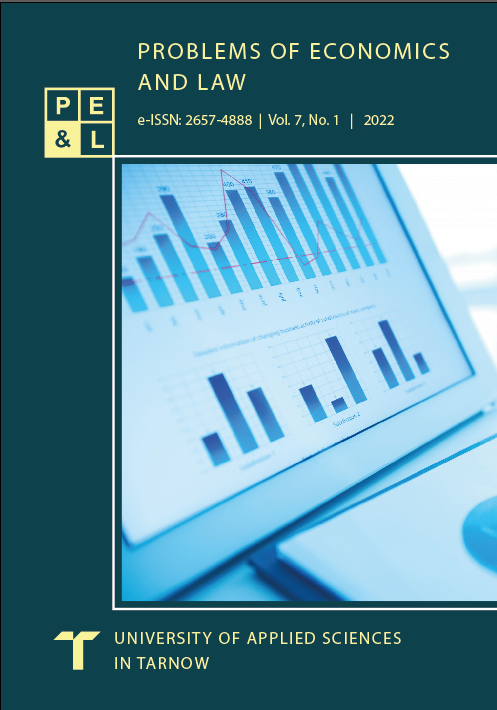Optimizing the choice of the form of taxation on the example of a micro-enterprise
DOI:
https://doi.org/10.55225/pel.419Keywords:
tax scale, flat rate tax, lump sum on registered income, revenues, costs of obtaining revenuesAbstract
Aim: The main objective of the article is to analyze the impact of various forms of taxation on the level of the tax burden in a micro-enterprise, with the simultaneous determination of the possibility of tax optimization by selecting a specific form of taxation.
Material and methods: As part of the research, the registration data of micro-enterprises from the retail industry for 2019–2021 were analyzed, resulting from the tax book of revenues and expenses. Additionally, it was checked what would be the tax burden of the analyzed enterprise in 2022 (it was assumed that the revenues obtained would be at the same level as in 2021).
Results and conclusions: The research on the form of taxation used by the entrepreneur made it possible to determine the factors that should be taken into account when determining the tax due. Despite the initial correct decisions to optimize the amount of tax, the following years have shown the importance of a thorough assessment of individual forms of taxation. This is because it enables the improvement of the financial and property situation, and may also contribute to significant development in the future.
Downloads
References
Chróścicki, P., Gwóźdź, D., Kiereś, A., Knap, W., Mazur, Ł., Sakowska, A., Wojtowicz-Janicka, K. (2012). Optymalizacja podatkowa. Warszawa: Wolters Kluwer Polska. Google Scholar
Sierpińska, M., Niedbała, B. (2003). Controlling operacyjny w przedsiębiorstwie: centra odpowiedzialności w teorii i praktyce. Warszawa: Wydawnictwo Naukowe PWN. Google Scholar
Spoz, A. (2012). Wybrane metody optymalizacji podatkowej przedsiębiorstw. Zeszyty Naukowe Uniwersytetu Szczecińskiego. Finanse, Rynki Finansowe, Ubezpieczenia, 52, 237–246. Google Scholar
Walicka, M. (2012). Optymalizacja podatkowa w działalności gospodarczej małych przedsiębiorstw. Zeszyty Naukowe Uniwersytetu Szczecińskiego. Finanse, Rynki Finansowe, Ubezpieczenia, 52, 271–281. Google Scholar
Nenca, M., Zawadzka, D. (2014). Wybór formy opodatkowania dochodu mikroprzedsiębiorstw jako metoda optymalizacji podatkowej. Zeszyty Naukowe Uniwersytetu Szczecińskiego. Finanse, Rynki Finansowe, Ubezpieczenia, 68, 25–36. Google Scholar
Famulska, T. (2015). Reakcje przedsiębiorstw na obciążenia podatkowe (na przykładzie podatku od towarów i usług). Optimum. Studia Ekonomiczne, 1(73), 137–151. DOI: 10.15290/ose.2015.01.73.12. DOI: https://doi.org/10.15290/ose.2015.01.73.12 Google Scholar
Jarczok-Guzy, M. (2015). Optymalizacja opodatkowania dochodu w małym przedsiębiorstwie. Zeszyty Naukowe Uniwersytetu Szczecińskiego. Finanse, Rynki Finansowe, Ubezpieczenia, 1(76), 79–88. DOI: 10.18276/frfu.2015.76/1-07. DOI: https://doi.org/10.18276/frfu.2015.76/1-07 Google Scholar
Wilimowska, Z., Urbańska, K. (2009). Uwarunkowania działalności mikroprzedsiębiorstw na rynku polskim. Nysa: Oficyna Wydawnicza Państwowej Wyższej Szkoły Zawodowej. Google Scholar
Walczak, B. (2009). Strategie podatkowe i para podatkowe jako narzędzie zarządzania finansami przedsiębiorstwa. W: A. Bielawska (red.). Nowoczesne zarządzanie finansami przedsiębiorstwa (s. 237–256). Warszawa: C.H. Beck. Google Scholar
Wyciślok, J. (2013). Optymalizacja podatkowa: legalne zmniejszanie obciążeń podatkowych. Warszawa: C.H. Beck. Google Scholar
Felis, P. (2014). Wybrane rozwiązania opodatkowania małych przedsiębiorstwa – ocena i proponowane kierunki zmian. Studia BAS, 1(37), 109–139. Google Scholar
Wójtowicz, W. (2009). Prawo podatkowe – część ogólna i szczegółowa. Warszawa: C.H. Beck. Google Scholar
Downloads
Published
How to Cite
Issue
Section
License
Copyright (c) 2022 Sebastian Kubala

This work is licensed under a Creative Commons Attribution-ShareAlike 4.0 International License.





